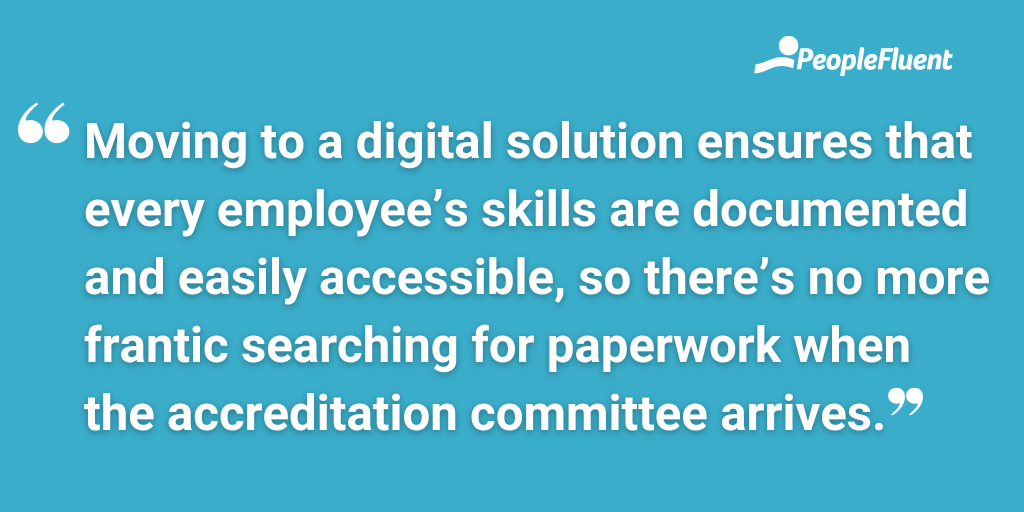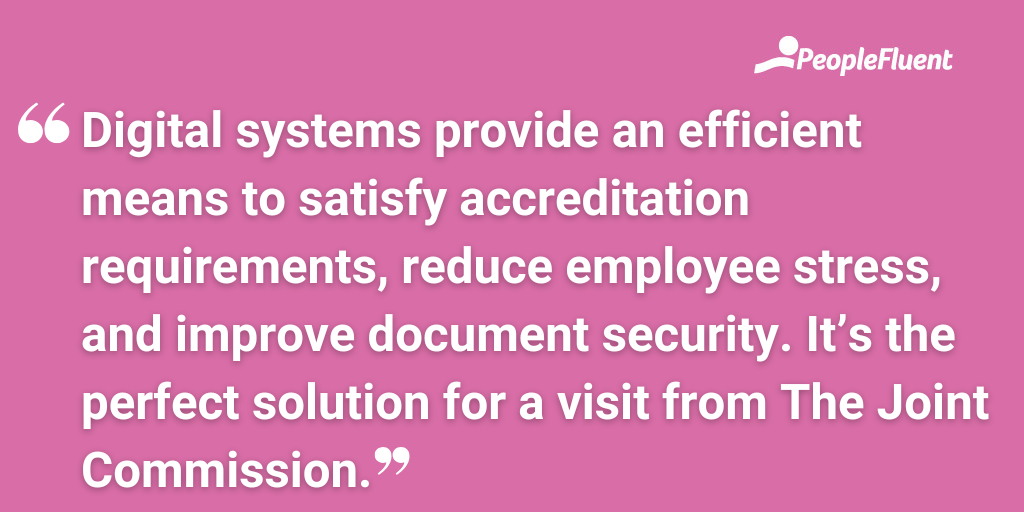Published: Mar 20, 2023Time to read: 4mins Category: Talent Management
How Digital Skills Management Prepares Your Healthcare Organization for a Joint Commission Visit
Accreditation worries causing a panic? There’s a “cure!” Skills management software can help prepare you for a visit from The Joint Commission and make accreditation a breeze. Read on to learn how it works and how to correctly administer the solution.
The Joint Commission is the largest healthcare accreditation body in the United States, which means it’s highly likely this accrediting agency will assess your healthcare staff’s clinical competencies. It’s crucial that your clinical teams are ready. The problem is, accrediting agencies often don’t provide much notice before they show up to assess one of your facilities. It can be a stressful situation for your clinicians and department managers.
The last thing you want during a Joint Commission visit is to be fumbling around for proof that your staff are up-to-date on clinical competencies. Luckily, digital skills management software makes it easy to document and securely store your employee assessment data.
Ditch the Paper and Improve Your Processes
Each time you hire a new clinician, you need to assess their clinical competencies prior to them providing patient care, and these assessments need to happen within their first 90 days on the job. For some roles—like nursing—that can be up to 50 unique skills. Supervisors need to witness competencies “in action,” so new clinicians often carry large binders with them everywhere they go during their first three months.
Carrying binders with checklists ensures new clinicians are prepared to document their skills, but hauling paper around while treating patients isn’t efficient.
Not only do paper documents put extra (and unnecessary) pressure on new hires, they’re also risky. Physical documents can easily be misplaced and lost. If The Joint Commission arrives and asks to see documentation of a new hire’s competency assessment, a lost binder makes it difficult, if not impossible, to prove your employee’s skills are current.

READ MORE ON PROCESS IMPROVEMENT | ‘Do Your HR Processes Align With the Depth of Your Technology?’
Converting competency documentation to a digital format means eliminating bulky binders for your new clinicians. Instead, your practitioners can access the documents using your organization’s devices, such as tablets and department computers, with secure login credentials. New hires can focus more on acclimating to your organization and providing the best possible patient care without worrying about where they last set down their competency binder.
Digital competency documentation also makes life easier for your seasoned clinicians. Each department will be assessed on three to five skills annually, and you won’t know which skills The Joint Commission will ask to see until they’re at your door. Every employee needs to keep their skills current and documented. When you’re using manual processes, it’s all too easy for something to get misfiled or misplaced.
Moving to a digital solution ensures that every employee’s skills are documented and easily accessible, so there’s no more frantic searching for paperwork when the accreditation committee arrives.
GET A SKILLS CHECK-UP | ‘The 5 Most Important Skills for Healthcare Leaders’
Secure Your Employee Skills Data
Losing an employee’s competency binder isn’t the only risk to paper processes. Although highly unethical, it is possible for paper documents to be manipulated. Digital documents add additional security and peace of mind that your clinicians are all capable of the skills being documented in their files.
Using a digital skills management system prevents unauthorized access to competency documentation through secure logins, making it much less likely for assessment data to be manipulated.
Digital systems can also be configured to assign competencies to job families. This makes it easier for healthcare teams to sign off on employees’ skills. It’s very likely clinicians will work with multiple supervisors and other employees authorized to sign off on skills assessments. Digital documentation systems make it easier for multiple individuals on a healthcare team to access a clinician’s file without compromising the document’s integrity.

KEEP READING | ‘8 Data Visualizations Available With PeopleFluent Performance, Compensation, and Succession’
Scrubbing Up for Accreditation
Digital skills management solutions make life easier for your staff and prepare you for accreditation. They eliminate the need for bulky binders and physical storage. Your new hires won’t need to haul paperwork around while trying to focus on patient care. Plus, they’re just easier to work with.
When The Joint Commission arrives to assess your organization, your supervisors won’t struggle to locate proof of employee competencies. Digital systems provide an efficient means to satisfy accreditation requirements, reduce employee stress, and improve document security. It’s the perfect solution for a visit from The Joint Commission.
Discover How Skills Management Software Can Work for Your Healthcare Organization
Worried about an inspection from The Joint Commission? Let us help you prepare with a secure, easy-to-access digital solution. Download the product sheet, or schedule a demo today.